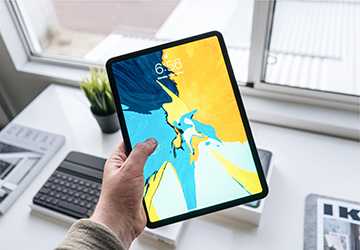Tablet vs Laptop: The Ultimate Comparison
Portability and Mobility: The Tablet's Comfort Zone
When it comes to portability, tablets have established themselves as the champions. Their slim design, lightweight form factor, and easy interface make them the ultimate portable device. They're so light and unobtrusive that you can carry them in one hand or slip them into a small bag with ease. This makes them highly attractive to frequent travelers or those always on the move. If you're someone who constantly finds themselves away from a desk and needs quick access to digital information, then in terms of Device Comparison, a tablet would likely be your go-to device.

The Raw Power and Multitasking Capabilities of Laptops
On the other side, laptops are the undisputed titans of computing power and versatility. These machines come packed with powerful processors, expansive storage options, and numerous ports for all your peripherals. This makes them ideal for tasks that require heavy computing resources, such as 3D rendering, large-scale data analysis, or high-end gaming. If you're a professional who needs to run multiple complex software applications simultaneously, then a laptop would serve you well. Thus, when considering performance in Device Comparison, laptops generally have the upper hand.
Operating Systems and Software: Choice and Flexibility
Operating systems often serve as a decisive factor when people make a Device Comparison. Tablets usually run on mobile-based operating systems like Android or iOS, which are designed to be more user-friendly but are generally less powerful and flexible than desktop operating systems. Laptops, by contrast, operate on full-scale desktop operating systems like Windows, macOS, or Linux. These systems offer extensive customization options and can run a broader range of software applications. Your specific needs could tip the scale to favor one device.
Battery Endurance: Where Tablets Shine
One of the most compelling advantages of tablets is their extended battery life. Engineered to run less complex tasks and utilize energy-efficient components, tablets can often last an entire day on a single charge. Laptops, though more powerful, require more energy to run, significantly reducing their battery lifespan. This is especially noticeable when running resource-intensive programs or multitasking if you're frequently away from a power source but still need constant access to a device.
Economic Factors: Budgetary Considerations
Pricing is often a significant factor when deciding on a new device. Generally, tablets are more budget-friendly, especially if you want to accomplish basic tasks like internet browsing, watching movies, or light document editing. However, if you need more computing power, the investment in a laptop will pay off in the long run. So, while tablets are often cheaper upfront, a computer can offer more value over time, depending on your specific needs.
The Emergence of Hybrids: The Middle Ground
Last but not least, the rise of hybrid devices aims to bridge the gap in the Tablet vs Laptop debate. These hybrid systems offer detachable keyboards, touchscreen functionalities, and sometimes even dual operating systems. They're designed to provide the portability of a tablet while not sacrificing the computing power of a laptop. If you find it challenging to decide between the two, a hybrid could be the perfect solution.

Connectivity Options: A Balancing Act
Regarding connectivity, laptops typically offer a broader array of options than tablets. USB ports, HDMI outputs, and ethernet connections are often standard on most laptops, allowing you to connect various peripherals, from printers and scanners to external displays. This capability can be essential if you're a professional who needs to make presentations, connect to wired networks, or use specialized hardware. Tablets, on the other hand, usually have limited connectivity options, often restricted to a single port for charging and data transfer. Some high-end tablets offer additional connectivity through optional accessories, but these are generally less versatile compared to what laptops provide. Hence, if connectivity is a crucial factor in your Device Comparison, a computer might be more suitable for your needs.
Screen Quality and User Experience: A Feast for the Eyes
In the past, tablets were generally considered inferior to laptops regarding display quality. However, the tables have turned in recent years. Many modern tablets boast high-resolution, color-accurate displays that can rival, and sometimes even surpass, laptop screens. The quality of the screen can be a significant factor if you're into digital art, photo editing, or even if you consume a lot of media. Laptops have been included, though; many models offer OLED or Retina displays, but these usually come at a higher cost. If high-quality production is a priority, the tablet is your Best Computing Device, considering its typically lower price point for comparable screen quality.
Adaptability and Learning Curve: User-Friendliness vs. Customization
Another crucial factor influencing your decision is how quickly you can adapt to the device. Tablets generally offer a more intuitive user experience, with easy-to-understand touch gestures and simple operating systems. This makes them an excellent choice for people who are not tech-savvy or for children who are just starting to learn about technology. Laptops, with their more complex operating systems and many functions, have a steeper learning curve but offer more control and customization. For power users who like to tweak settings and personalize their experience, a laptop could be the Best Computing Device.
Software Ecosystem: A Tale of Two Worlds
The availability of software applications can also make a significant difference in your Device Comparison. Laptops running on more robust operating systems like Windows or macOS have access to a vast range of professional-grade software for tasks like video editing, 3D modeling, and advanced data analysis. Tablets have made strides in this area, but their mobile-based operating systems still restrict them to app stores that may offer a partial suite of software capabilities that a professional might need.


